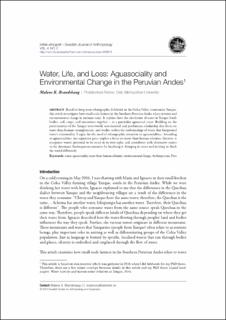| dc.contributor.author | Brandshaug, Malene Karensdatter | |
| dc.date.accessioned | 2023-10-31T08:16:30Z | |
| dc.date.available | 2023-10-31T08:16:30Z | |
| dc.date.created | 2023-10-30T13:30:44Z | |
| dc.date.issued | 2021 | |
| dc.identifier.citation | kritisk etnografi - Swedish Journal of Anthropology. 2021, 4 (2), 51-66. | en_US |
| dc.identifier.issn | 2003-7201 | |
| dc.identifier.uri | https://hdl.handle.net/11250/3099610 | |
| dc.description.abstract | Based on long-term ethnographic fieldwork in the Colca Valley community Yanque,
this article investigates how small-scale farmers in the Southern Peruvian Andes relate to water and
environmental change in intimate ways. It explores how the circulation of water in Yanque binds
bodies, soil, crops, and mountains together – in a particular aguasocial sense. Building on the
particularities of the Yanque waterworld, neo-material and posthuman scholarship that focus on
more-than-human entanglements, and studies within the anthropology of water that foreground
water’s relationality, I argue for the need of ethnographic attention to aguasocialities. Attending
to aguasocialities, my argument goes, implies a focus on more-than-human relations; likewise, it
recognises water’s potential to be social in its own right, and contributes with alternative stories
to the dominant Anthropocene narrative by localising it, bringing in water and inviting to think
the world differently. | en_US |
| dc.language.iso | eng | en_US |
| dc.title | Water, Life, and Loss: Aguasociality and Environmental Change in the Peruvian Andes | en_US |
| dc.type | Peer reviewed | en_US |
| dc.type | Journal article | en_US |
| dc.description.version | publishedVersion | en_US |
| cristin.ispublished | true | |
| cristin.fulltext | original | |
| cristin.qualitycode | 1 | |
| dc.identifier.doi | diva2:1626741 | |
| dc.identifier.cristin | 2190008 | |
| dc.source.journal | kritisk etnografi - Swedish Journal of Anthropology | en_US |
| dc.source.volume | 4 | en_US |
| dc.source.issue | 2 | en_US |
| dc.source.pagenumber | 51-66 | en_US |
